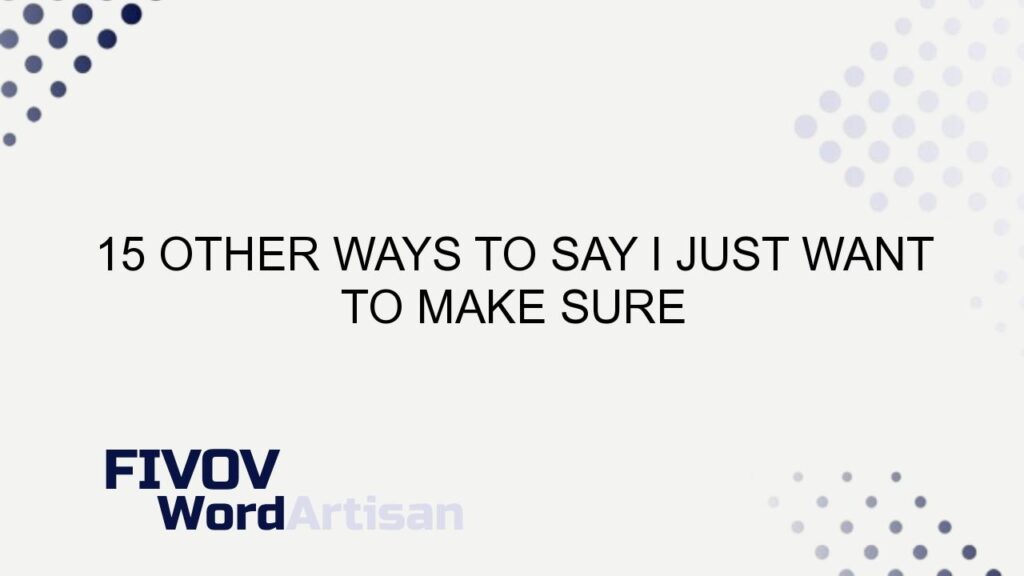Are you attempting to determine if something is feasible but find yourself needing to inquire first? Maybe you’re concerned that the phrase “I just want to make sure” might not be the most professional way to ascertain if an action can be undertaken.
MY LATEST VIDEOS
Well, you’ve come to the right place to find out more.
Other Ways to Say “I just want to make sure”
So, you want to ensure that your communication is clear, respectful, and effective. Here are some alternative phrases you can use to convey the same message in a professional and polished manner.
1. “I’d like to confirm”
2. “I want to verify”
3. “Just to double-check”
4. “To ensure”
5. “May I clarify”
6. “To be certain”
7. “I’m seeking reassurance”
8. “Asking for confirmation”
9. “To make certain”
10. “Seeking validation”
11. “Verifying”
12. “To validate”
13. “I need to be sure”
14. “To confirm”
15. “To validate my understanding”
Using these alternatives can help you express your intention to ensure accuracy or understanding in a more professional and effective way. Let’s explore why it’s important to communicate clearly and how using these phrases can make a difference.
Why Clear Communication Matters
Clear and effective communication is essential in both personal and professional settings. It ensures that messages are accurately conveyed and understood, reducing the risk of misunderstandings, errors, or confusion. When seeking confirmation or clarification, using the right language can enhance your image and demonstrate professionalism.
How to Use These Phrases Appropriately
When choosing an alternative to “I just want to make sure,” consider the context and the relationship you have with the person you’re communicating with. It’s important to maintain a respectful and considerate tone while ensuring your message comes across clearly.
For formal or professional settings, phrases such as “I’d like to confirm” or “I want to verify” can convey your intention in a polished and respectful manner. On the other hand, in more casual or familiar settings, phrases like “Just to double-check” or “To ensure” can be appropriate while maintaining a friendly tone.
When to Use Each Alternative
Different situations may call for different phrases when seeking confirmation or clarification. Here’s a guide to help you choose the most suitable alternative based on the context:
– “I’d like to confirm” – Suitable for formal or professional situations, such as business communications, meetings, or interviews.
– “I want to verify” – Conveys a strong sense of determination to ensure accuracy, ideal for serious or important matters.
– “Just to double-check” – Works well in both formal and informal settings, providing a friendly and approachable tone.
– “To ensure” – A versatile phrase suitable for various contexts, indicating a commitment to accuracy and understanding.
– “May I clarify” – Polite and professional, suitable for seeking additional information or understanding.
– “To be certain” – Assertive and to the point, ideal for situations where absolute certainty is required.
– “I’m seeking reassurance” – Helpful in interpersonal communications, expressing a need for understanding or validation.
– “Asking for confirmation” – Direct and clear, suitable for formal or professional settings when seeking validation.
– “To make certain” – Conveys a strong resolve to ensure accuracy, ideal for critical or sensitive matters.
– “Seeking validation” – Expresses a need for assurance or confirmation, suitable for interpersonal or professional interactions.
– “Verifying” – Clear and concise, ideal for conveying a direct intention to confirm or clarify.
– “To validate” – Signals a need to confirm or verify information, suitable for formal or professional interactions.
– “I need to be sure” – Assertive and direct, suitable for situations where certainty is crucial.
– “To confirm” – Straightforward and clear, appropriate for both formal and casual settings when seeking validation.
– “To validate my understanding” – Expresses a need to ensure comprehension, suitable for in-depth or complex discussions.
By selecting the most appropriate alternative based on the context, you can effectively convey your intention to ensure accuracy and understanding in a polite and professional manner.
Using Language Effectively
Language plays a crucial role in how we are perceived and the effectiveness of our communication. By choosing the right phrases when seeking confirmation or clarification, you can enhance your professionalism and ensure that your message is received positively.
In professional settings, using polished and respectful language demonstrates your attention to detail and your commitment to clear communication. This can enhance your professional image and build trust with colleagues, clients, or stakeholders.
In personal or informal settings, using friendly and approachable language can help maintain positive and harmonious relationships while ensuring that your message is understood as intended.
FAQs
Is it important to use professional language in communications?
Yes, using professional language in communications is crucial, especially in formal or business settings. Professional language conveys respect, competence, and attention to detail, contributing to effective and positive interactions.
How can I ensure that my message is understood clearly?
To ensure clear understanding, consider the recipient’s perspective and choose language that is clear, concise, and appropriate for the context. Using specific and direct phrases to seek confirmation or clarification can help convey your message effectively.
What are the benefits of using alternative phrases for “I just want to make sure”?
Using alternative phrases can enhance your professionalism, demonstrate your commitment to accuracy and understanding, and improve the overall quality of your communication. It can also contribute to building positive relationships and trust.
Conclusion
When seeking confirmation or clarification, using the right language can make a significant difference in how your message is received. By opting for professional and polished alternatives to “I just want to make sure,” you can ensure that your intention to ensure accuracy or understanding is communicated effectively.
Clear communication is essential for successful interactions, both professionally and personally. By choosing the most appropriate alternative based on the context and your relationship with the recipient, you can convey your message in a respectful, clear, and professional manner.
Remember, the way you communicate reflects your professionalism and attention to detail. Using the right phrases when seeking confirmation or clarification can contribute to building trust, enhancing relationships, and ensuring that your message is received positively.
Feel free to share this article with your colleagues, friends, or anyone who can benefit from improving their communication skills. Encourage others to use these professional alternatives, and together, we can elevate the quality of our interactions and communication.
Thank you for reading, and best of luck in using these alternatives to “I just want to make sure” with confidence and professionalism.



